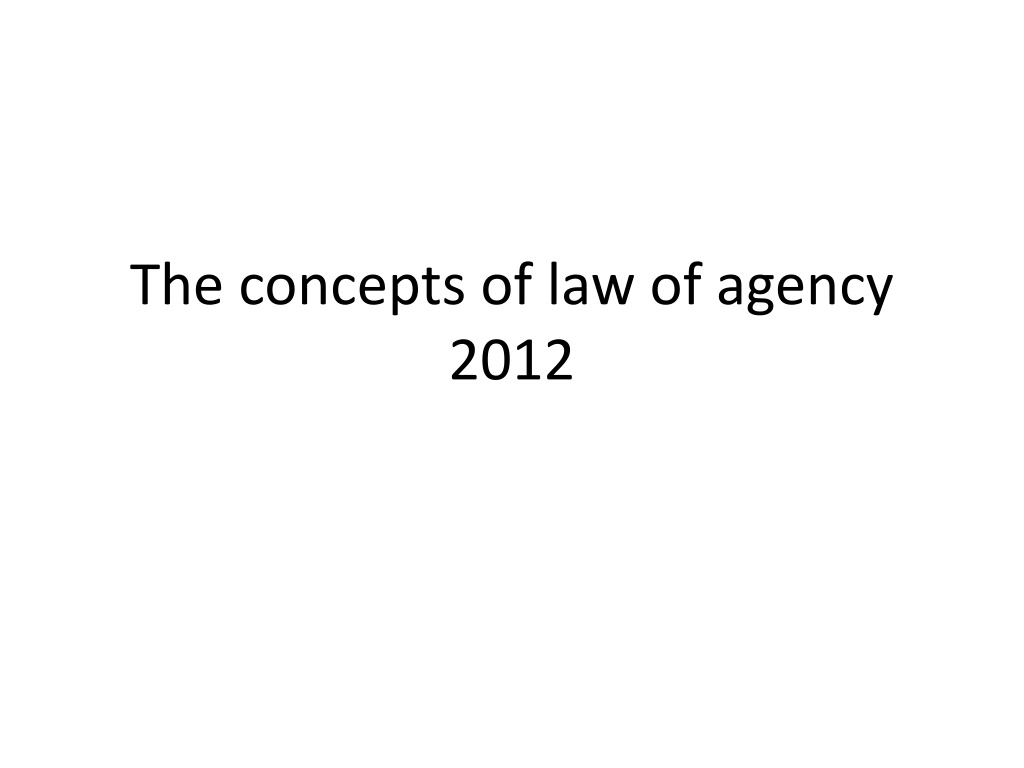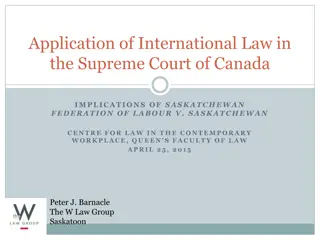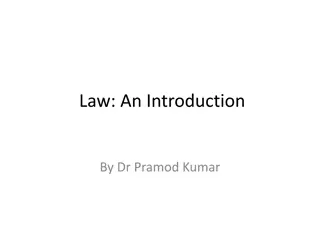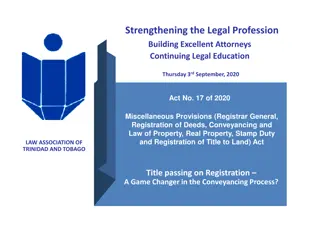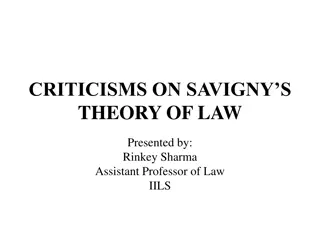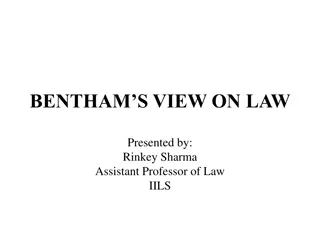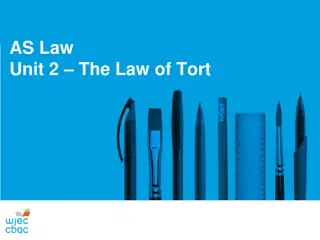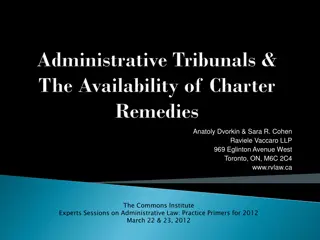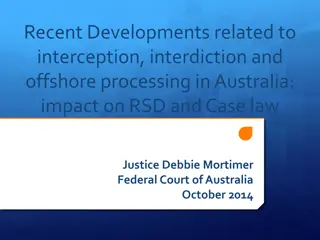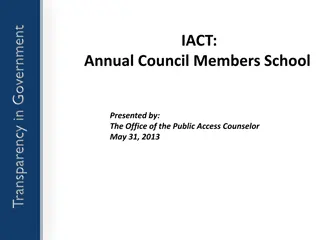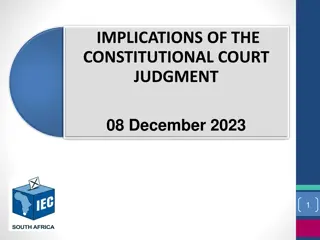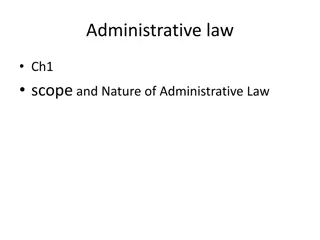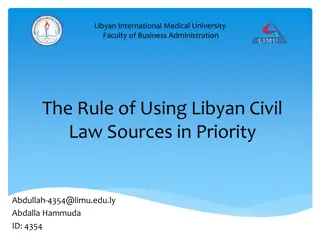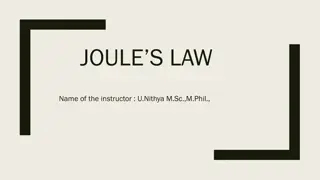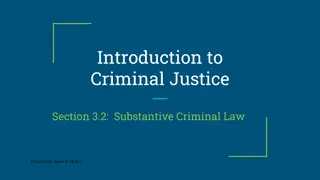Understanding the Law of Agency: Rationales and Implications
The law of agency explores the need for representation in legal and commercial matters. It considers scenarios where individuals require agents to overcome limitations of time, place, business knowledge, and experience. This article delves into the practical aspects and implications of agency relationships, shedding light on the complexity of modern commercial transactions and the benefits of engaging an agent.
Download Presentation

Please find below an Image/Link to download the presentation.
The content on the website is provided AS IS for your information and personal use only. It may not be sold, licensed, or shared on other websites without obtaining consent from the author. Download presentation by click this link. If you encounter any issues during the download, it is possible that the publisher has removed the file from their server.
E N D
Presentation Transcript
Law of Agency 1.1 the need for an agency It is plainly discernable from the very first article of the Ethiopian civil code that the human person is the subject of rights and duties from its birth to its death. See art. 1 of cc In a similar fashion, artificial persons are also the subjects of rights and duties from their formation (registration) to their liquidation (cancellation of register). Art. 117-121 Furthermore, per the dictations of the civil code, every person is presumed capable unless expressly declared incapable by law. i.e., s/he is presumed to have the necessary legal capacity to exercise the attribute features of his or her legal personality or to personally take care of his or her interest. Read Arts. 117 to 121 of the com. code. The immediate implication of registration of a business organization is legal personality and cancellation of registration is winding up of it. see arti. 119- Consult Art. 192 of the civil code of Ethiopia
From this logic a question should emanate that, so far as every person is capable of personally exercising his or her own affairs in everyday life (which is the most preferable), why should there be a need for representation or agency by another person (who is even presumed to have his own personal engagements)?
The practical experience (legal or otherwise) in Ethiopia or elsewhere reveals that the following are the major rationales that triggered the need for representation by another person: It helps to overcome limitation (constraints) of time and place: imagine that you are a prosperous business person running your business throughout the country and it is also in the nature of the businesses you are running that they require your immediate attention or else the consequence will be unbearable. On the other hand, nevertheless the modern commercial world is too complex, you are just a human person that can only be at a place at a given time or do a thing at a time. In such situations, the basic way out to escape bankruptcy would be hiring an agent who act on your behalf and help you to overcome such inherent limitation.
It helps to overcome lack of business knowledge or experience: it is an open secret that knowledge and experience are not the only inputs to start a business. However, with them added to the menu of a trader, the business venture can get more attractive. In this regard, hiring an agent (a professional) enables one to perform certain tasks which s/he has neither the required knowledge nor experience to perform by themselves. Read Arts. 2234, 2251 for special agents called commission and forwarding agents, respectively and Art. 44 of the com. Code for commercial agents.
It is a tool to overcome the pitfalls of incapacity: as mentioned above, for various reasons the law has precluded some groups of persons from personally exercising their rights and duties. However, it is not fair that they should remain remedy-less for they are at least possessors of rights and duties as a person. Here emerges the necessity of agency that these groups of persons can be capable of safely exercising their rights and duties (take care of their interests) via means of representation by other capable individuals. According to Articles 192-194 of the civil code there are two types of such disabilities: General disabilities (which depend on the age or mental condition of persons or on sentences passed upon them) and Special Disabilities (which depends on reasons of their nationality or functions exercised by them). Refer to Arts. 204-209, 263, and 359 of the civil code
The very nature of artificial persons: it is a clear fact that such persons are endowed with legal personality artificially (as opposed to naturally) for the sake of convenience in control and other rationalities. Otherwise, they are non-living things (associations of capital) that lack the necessary mental capability to analyze the cost and benefit of their transaction. Hence, it is inherent in their very nature that they need to be represented by physical persons who will act on their behalf and deal with third parties. For instance, the founders, managers, directors, and secretaries, of all business organizations are natural persons who are authorized to act on their behalf. Read Art. 216 of the com. Code. It states that a business organization shall acquire rights and incur liabilities by its agents in accordance with the provisions relating to agency. Read also Arts 35-36 of the same.
1.2 Sources of Agency The representative capacity (power of attorney) to act on behalf of another person (artificial or natural) may emanate from the following basic sources: 1.2.1 The Law It is obvious from the reading of Art. 2179 of the civil code of Ethiopia that, the authority to act on behalf of another person may derive from the law. This is the case where the law appoints an agent to act on behalf of another person for reasons like the protection of the principal that may otherwise be at stake if s/he acts by himself or herself. This become crucial in case the principal is declared incapable by law. Art. 192 of the civil code states that, every physical person is capable of performing all acts of civil life unless he is declared incapable by the law. Read also Arts. 193 and 194 of the civil code
The other situation where the law appoints an agent is the case of agency of necessity or unauthorized agency. In this regard the very nature of artificial persons that necessarily dictate their representation by natural persons to perform their day to day activities is typical. Read Arts. 2257 to 2265 of the civil code. It is an agency established by law where an individual standing from the middle of nowhere and without any express appointment by the principal takes care of the affairs of another person being dictated by necessity or otherwise. Read Art. 216 (2) of the com. Code, which dictate that a business organization shall act in legal proceedings by its agents.
1.2.2 Contract The basic source of agency is a contract. As different from the first, this is a relationship created between the agent and the principal based on their genuine contractual engagement. The contract should, among other things, define the scope of the representative capacity of the agent and its duration. Art. 2199 of the civil code states that, agency is a contract where by a person, the agent, agrees with another person, the principal, to represent him and to perform on his behalf one or several legally binding acts.
1.2.3 Decision of the Court This is a situation where the authority to do an act or acts of a certain kind on behalf of another emanates from the decision of a court. Such types of agents are known as curators. Refer to Arts. 2253 to 2256 of the civil code. Such appointment is however upon complaint. Read also Art. 950 of the civil code for the appointment of a judicial-liquidator of succession by the court.
1.3 Definition of Contract of Agency Per Article 2199 of the civil code, Agency is a contract whereby a person, the agent, agrees with another person, the principal, to represent him and to perform on his behalf one or several legally binding acts. Definitional Elements: agency is a contract. It is actually a special type of contract which expressly deals with the relationship between the agent and the principal. For contracts are the cornerstones of the economy the law has stipulated stringent requirements of validity
Hence, agency as a contract is expected to fulfill the essential validity requirements for the existence of a valid contract mentioned under article 1678 of the civil code in relation to capacity, consent, object and form. Read Art. 1675 of the civil code which defines a contract as, a contract is an agreement whereby two or more persons as between themselves create, vary or extinguish obligations of proprietary nature. Read also Arts. 2200-2201 of the civil code
The other point to discern here is, this contract refers only to the internal contract concluded as between the agent and the principal and it basically governs their bilateral relationship. However, this contract is the main input for the conclusion of another contract, called external contract, as between the agent and another third party. It is understandable that the purpose of appointing an agent is to deal with third parties via means of an intermediary. The other point of emphasis should be how many parties are there in a certain agency relationship? Before one dares to answer this question, as mentioned above, s/he should be aware of the fact that there are two types of contracts under a certain agency relationship.
Having this in mind the following are the parties to a certain agency relationship: The person represented- the principal. The representative- the agent. The person with whom the agent concludes the external contract- the third party.
Technically however, one should raise a question as to whether the agent is really a party to the external contract concluded between the agent and the third party? And the answer is obvious, i.e., the agent is not presumed to be a party to a certain agency relationship for s/he is a mere facilitator or mediator as between the principal and the third party with whom the contract is concluded. Otherwise stipulated, the agent does not assume any personal liability or benefit from the transaction as far as s/he is representing the best interest of the principal or act on behalf, in the name of and the exclusive interest of the principal. Read Art. 2189 of the civil code
Finally, we should understand that the acts which the agent undertakes to perform on behalf of the principal are juridical acts- acts that are legally binding or otherwise constitute a fault and entail legal liability. However, in the normal course of events (without personal fault on his part), the agent is not liable for the performance of the contract contracted with the third party. You may read Art. 2212 of the civil code. However, s/he shall be liable for non-performance, if they are aware of the insolvency of the third party or ought to have known it at the time of making the contract.
6 1.4. Scope of Representation By scope of representation are indirectly referring to the object of the internal contract. The main object of the internal contract is not different from defining the depth and nature of the power of attorney vested on the agent. That means, the agent can act and bind the principal if and only if he performed those powers vested in him by the contract of agency. Though the scope of agency shall be expressly stipulated in the contract, which may not be always the case. In such cases, the scope shall be determined or fixed according to the nature of the transaction to which it relates. The non fulfillment of this obligation would be against the interest of the principal for it will encourage unauthorized agency. Read Arts 2187, 2202 and 1713 of the civil code
1.4.1 Complete Representation The agent is deemed to completely represent the interest of the principal in the following cases: If the agent acts in the name and on behalf of the principal and the third parties with whom the agent is contracting are aware of the fact that he is an agent of another person. This is the case of disclosed principal. If the agent is acting with the scope of representation vested in him by the internal contract. And If the agent is representing the best interest of the principal or acts with the exclusive interest of the principal.
You should be aware of the legal implication of complete representation that, if the agent completely represents the principal, s/he would not assume any personal liability and all the acts of the agent bind the principal towards the third party as if they are performed by the principal himself. In all other case however, the agent is presumed to have acted in his own name and behalf which will make him personally liable to the third party with whom he is contracting. The latter case amounts to the cases of undisclosed principal. Read Arts. 2197 and 2198 of the civil code Read Art 2189 of the civil code
1.4.2 Types of Agency According to Article 2202 of the civil code, there are two types of agency. These are General and Special types of agency. Now let s discuss them as follows: General Agency It is a situation where the agent is vested with the power to deal with all the affairs of the principal of a particular type or in a particular place. Such agents are agents who are in general authorized to represent the principal. One could say they are trustworthy persons to the principal in that the principal authorizes them to entirely represent his interest. As a result, such agents are only authorized to perform acts called acts of management on behalf of the principal. Read Art. 2204 of the civil code
What kind of acts do you think are acts of management? The following are some examples of acts of management: Acts done for the maintenance or preservation of property; Lease for terms not exceeding three years; The collection of debts that are matured or legible; The discharge of debts; The investment of income; and The sale of crops or goods intended to be sold or perishable commodities
B. Special Agency It is an agency whereby the agent is authorized to transact or deal with specific business affairs of the principal. Such agents are mostly professional agents who expertise in cutting a deal for a specific transaction. As a result most of the acts done by such agents are acts of liquidation or disposal. Such agents are prohibited from performing acts called acts of management. Besides, their service as an agent is deemed to be of a short term (until disposal). The other thing one should be aware is special agency shall confer on the agent authority only to conduct the affairs specified in the contract and their natural consequence according to the nature and usage therein.
What kinds of acts, do you think are acts of disposal? An agent may not deal with the following acts without a special power of agency: Alienation or mortgage of immovable property; The investment of capital Sign bill of exchange Make donation Effect a settlement; and Defend an action on behalf of the principal. Read Art. 2202 (2) of the civil code Consult Art. 2206 of the civil code Refer to Art. 2205 of the civil code Read Art. 216 (2) of the com. Code of Ethiopia
1.4.3 Special Types of Agents a. Commission Agents: is an agent (natural or juristic person), who independently, professionally and for gain, undertakes to buy or to sell in his name, but on behalf of the principal, goods, movables or any other thing of a similar nature (securities or other fungible things). b. Forwarding Agents: are agents, which may be a carrier or a shipper who undertakes to act on his own name but on behalf of another person, called the principal, into a contract for the forwarding of goods. c. Curator Agents: this is an agents appointed by a court to represent and perform legally binding acts on behalf of another person upon application to that effect by the relatives or the spouse of the principal. d. Commercial Agents (brokers): is an agent (a natural or artificial person) who independently, professionally and for a gain, brings parties together for the purpose of their entering into an agreement such as contract of sale, lease, insurance or carriage. Read Arts. 60 of the com. Code and 2234 of the civil code Read Arts. 2251-52 of the civil code
1.5 Duties and Liabilities of the Parties to the K of Agency It is obvious that agency is a contract in which at least two parties bilaterally counter oblige themselves to perform certain obligation towards each other. Hence, both the agent and the principal in a certain agency relationship have their own respective duties in need to be discharged according to their agreement in particular and the law in general. i.e., failure to discharge by either party, if any, entails liability.
1.5.1 Duties and Liabilities of the Agent The following are the main duties of the agent in a certain agency relationship: The duty of strict good faith: the agent shall act with strict good faith towards his principal. This duty, among other things, requires the agent to disclose to his principal any circumstance which would justify the revocation of the agency or the variation of its terms. The duty to act in the exclusive interest of the principal: as mentioned earlier the agent is a mere facilitator. S/he shall not claim to have any personal benefit in their engagement with a third party on behalf of the principal.
As a result the agent is required to act in the exclusive interest of the principal and s/he may not, without the latter s knowledge, derive any benefit from any transaction in to which s/he enters in pursuance of his or her authority. Moreover, the agent may not make use to the detriment of the principal of any information obtained by him in the performance of his duties as an agent. The thing is, though it is normal that in due course of his activities Read Art. 2208 of the civil code For a better understanding cross refer Arts 2209, 2187-88 of the civil code the agent may face a conflict of interest, however, s/he should refer it to the ultimate decision of the principal. In this regard, you can further deepen your knowledge by referring to Arts. 30, 40, 47, and 55 of the com. code.
The duty of accounting: this is the other vital duty of the agent for mostly the activity of agents is related to the finance of the principal. Hence, it is the duty of the agent to account to the principal for all sums received by him and all profits accruing to him in due course of his employment, notwithstanding that the sums he received were not owed to the principal or there being existed an adverse claim to the monies collected. Besides, where the agent converted to his own use monies he owed to the principal, he shall be liable for the payment of interest as from the day of such use, without it being necessary that notice be given to him. Finally, this duty is deemed to be discharged when the accounts of the agent are duly approved by the principal.
The duty of diligence: the office of the agent, though voluntary in nature, creates a fiduciary relationship with the principal. Hence, the agent is expected to show the qualities of care, interest and fitness in his activities. Two folds of diligence may be expected from the agent. Firstly, the agent shall exercise the same diligence as a bonus pater familias in carrying out the agency as long as he is entrusted therewith. This is called the objective standard of duty expected from a paid or professional agent. Secondly, the agent is required to show the same degree of diligence or care as to his own or that he show in due course of taking care of his own personal affairs. This is called the subjective standard of care mostly expected from a gratuitous agent. Finally, the agent shall be liable for fraud and for defaults in the performance of his duties.
The duty of no delegation of authority: it is inherent in the nature of the obligation of the agent that s/he should perform his activities personally. As a result, the rule is the agent shall carry out the agency in person unless he is authorized by the principal to appoint a substitute or a delegate. However, such delegation may be impliedly accepted where from usage it appears a matter of indifference whether the agent acts personally or by the deputy or where the interest of the principal so requires or when unforeseen circumstances prevent the agent from carrying out the agency and he is unable to inform the principal of these circumstances. Cross refer to Arts.2210 and 2213-14 of the civil code. This is a Latin verse to mean, as a good father or leader of the family Refer to Art. 2211 of the civil code Cross refer Arts. 2215 and 1740 of the civil code. This goes with a maxim that, the Delegate may not Appoint a Delegate
On the other hand, in the following circumstances the agent shall be personally liable towards the third party he is dealing with and/or the principal: In case of undisclosed or partially disclosed principal: this is a situation where the agent acts on his own behalf with third parties, notwithstanding the fact that such thirds parties know that he is an agent of somebody else or not. Such an agent shall personally enjoy the rights or incurs the liabilities deriving from the contracts he makes with third parties and his acts whatsoever may not bind the principal. In case the agent abuses his authority: this is against the essence of fixing the representative capacity of the agent by the internal contract of agency concluded between the agent and the principal. Accordingly, the agent shall be liable to contracts made by him in the name of the principal outside the scope of his authority. However, it is up to the discretion of the principal to either opt to ratify or repudiate such ultra vires acts of the agent. In case the agent acts on a lapsed authority: sometimes the parties to the relationship may determine the duration of the viability of their relationship by fixing a period of time to that effect. That means the agent can legally represent the interest of the principal only and until the lapse or expiry of such period. Otherwise, if the agent acts on behalf of the principal after the expiry of the duration of his power of representation, s/he shall be personally liable.
In case of unauthorized agency: an agent who undertakes, with full knowledge of the acts, to do or manage the affairs of another person without having been appointed as an agent shall be personally liable towards the third party to the performance of the obligation he undertake to discharge. In a nutshell, the acts of such an agent shall not bid the person whose affairs have been taken care of. However, the principal may exercise either of the following options towards such acts of the agent and thereby bind himself or not for the deeds of the agent towards the third party: Ratification: this is the situation where the principal approves or ratifies the acts of the agent, nevertheless they are unauthorized. This happens, mostly, in cases where the interest of the principal required that the management be undertaken as a necessity. Read Arts. 2197-98 of the civil code Refer to Arts. 2190-2194 and 2202 of the civil code Refer to sub article 2 of Art.2190 of the civil code Read Art. 2257- 58 of the civil code.
Ratification has a legal effect of making the unauthorized acts of the agent binding against the principal. Repudiation: this is a situation where the principal rejects or disapproves the unauthorized acts of the agent. This automatically entails the personal liability of the agent towards the third party. The more the acts of the agent put the interest of the principal at stake, the more the principal tends to repudiate them.
The agent shall be generally liable towards the principal for his failure to discharge his obligation according to the contract of agency. i.e., failure to discharge all the duties of an agent mentioned above makes the agent personally liable to the principal. For instance, bad faith in due course of discharging the activities; in case of conflict of interest with the principal (in case the agents acts on behalf of multiple principals other than the one or the agent contracts with himself on behalf of the principal); failure to disclose important information; failure to account his activities or to submit report of the management of his affairs up on demand or periodically; fraud and defaults in his work; the agent shall be liable for the acts of the person whom he appointed or delegated without authorization as his substitute as if they were his own; the agent is also liable for the care with which he selected his substitute and gave him instructions, even with authorization of the principal to appoint a delegate. Refer to Art. 2264 of the civil code Read Art. 2265, 2193 of the civil code Refer to Arts. 2187, 2188, 2197, 2208, 2210-2216 of the civil code
1.5.2 The Duties and Liabilities of the Principal Most of the duties of the principal towards the agent are related to the fulfillment of various types of payments and security of resources of the agent who is acting on his behalf. On the other hand, the basic duty of the principal towards the third party is performance of the obligation undertaken by the agent towards the principal.
The following are the main duties of the principal towards the agent: The duty of remuneration: remuneration is a commission paid to the agent for the activities exercised by him. The problem is, due to either the voluntary nature of the office or the fiduciary nature of the relationship per se, the agent cannot claim remuneration as of right unless, such payment is contractually agreed upon or the acts are performed on a professional level (all cases of special agency) or it is customary to do so in the nature of the activities done by the agent. Moreover, though such payment may be contractually agreed upon, it is subjected to the full discretion of courts to either reduce or increase it, if it appears to be excessive or out of proportion to the services rendered by the agent. In this regard you may refer to Arts. 2219- 20 of the civil code.
The duty of Reimbursement: it is the main duty of the principal to advance to the agent the sums necessary or entirely the resources needed for the proper performance of his activities. Otherwise, if the acts of the agent are left behind due to the non-resourcefulness of the principal the latter shall be liable to the third party. This being the case however, if the agent happens to have covered such outlays or expenses by himself, then it is the duty of the principal to reimburse to the agent such costs incurred in the proper carrying out of the agency. The duty of reimbursement also includes the payment of interests by the principal, which are due from the day when they were incurred. The duty of Indemnification: this is also another type of payment, but for a different reason. This duty obliges the principal to make good (compensate) any damage of the agent sustained in the course of carrying out of the agency and which was not due to his own default. So the only Burdon of proof required from the agent would be to prove that the damage was sustained while practicing his agency. It is similar for all the above types of payments required from the principal that, first; they are not subjected to off-set by the principal under the pretext that the transaction was unsuccessful and second, until the payment of the sums due to him by reason of the agency, the agent shall have a lien on the objects entrusted to him by the principal for the carrying out of the agency. Refer to Art. 2221 of the civil code Read Arts. 2223- 24 of the civil code of Ethiopia.
Do you think the agent can exercise his right of lien on the documents evidencing the agency? Refer to Art. 2184-86 of the civil code. On the other hand, the following are the main liabilities of the principal: During ratification; In case he informed a third party of the existence of the power of attorney but failed to inform him of the partial or total revocation of such power; He failed to ask the agent to return the document evidencing the power of attorney and failed to seek a judicial decision to the effect that such document was revoked; Read Arts. 2192-2195, 2212, 2222, 2225, 2265 of the civil code
He caused in any other manner, in particular by his statements, behavior or failure to act, a third party to believe that the person with whom he was dealing was authorized to act on behalf of the principal. He is liable for the performance of the obligation towards third party. In case of plurality of principals, the principals shall be jointly liable to the agent for all the consequences of the contract.
1.6 Grounds for the Termination of Agency Relationship It is a universally known fact that everything that has a beginning has an end and agency relationship is not an exception to it. The following are the main grounds of termination of a certain agency relationship: Revocation of agency by the principal: it is within the full discretion of the principal to restrict or revoke the representative capacity (the authority he gave to the agent to make contract in his name) of the agent at anytime and to force the agent to restore to him the written instruments evidencing his authority. However, unless otherwise where the date was agreed upon in the principal s interest, he is at duty to indemnify the agent for any damage caused to him by the revocation where such revocation occurs prior to the agreed date or under conditions detrimental to the agent. If the principals are plural, the revocation of the agent may be effected only by the agreement of all the principals.
Renunciation by the agent: this is the action of the agent where he renounces or resigns his office voluntarily. In this case however, the agent is at duty to give notice of his resignation to the principal. This is due to a legal presumption that the agent is deemed to properly resign from his duties if and only if he is replaced by another. In a similar fashion, if such renunciation is detrimental to the interest of the principal, it is the duty of the agent to indemnify the principal unless the latter cannot continue the performance of his obligation without himself suffering a considerable loss.
Death or incapacity of the agent: in the absence of an otherwise agreement a contract of agency shall terminate by the death, declaration of absence, bankruptcy or incapacity of the agent. In such case the principal has a right to information about the happening by the heirs or representatives of such agent and the latter are at duty to take all the necessary steps to protect the interest of the principal. Death or incapacity of the principal: in a similar fashion the death, absence, bankruptcy or incapacity of the agent terminates the agency relationship. In this case however, for Cross refer Arts. 2226-27, 2183-84 of the civil code Read Art. 2229 of the civil code Read Art. 2230 of the civil code
the agent is still alive he has a duty of serving as a care-taker until the legal representatives of the principal take over the activity. Expiry of the duration of agency: if the contract was made for a defined period of time, the relationship terminates with the lapse of the period of time mentioned in the contract. Achievement of Object: if both parties perform properly and achieved the very purpose of their relationship ,there will be no reason for the continuation of their relationship. Refer to Arts. 2232 and 2182 of the civil code One can infer this from an otherwise reading of Art. 1821 of the civil code Read Art. 1806 of the civil code
